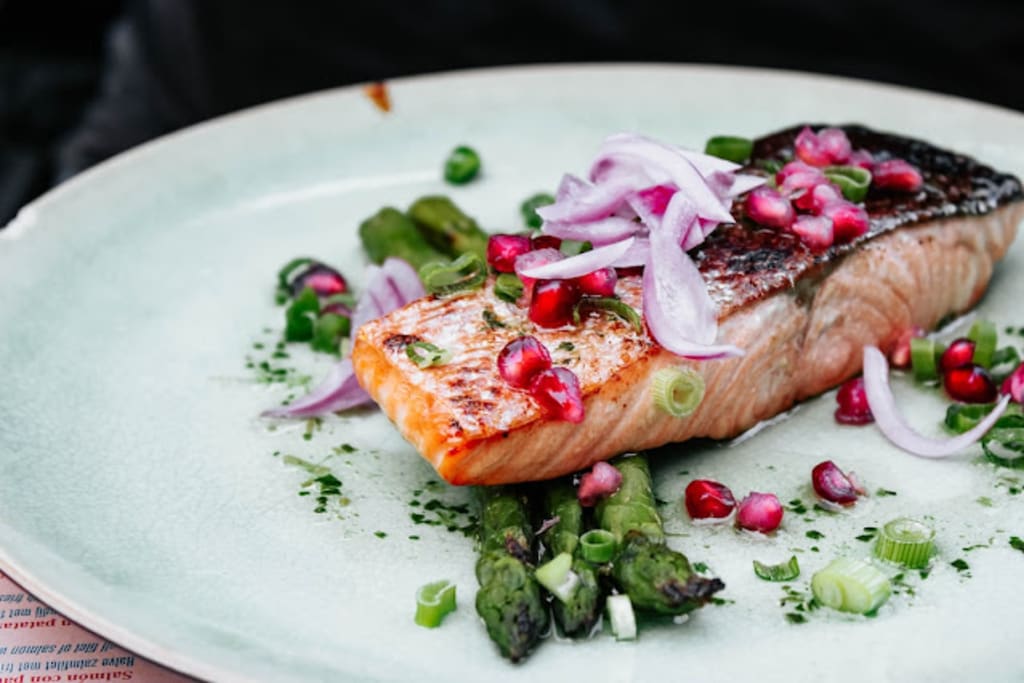
keto diet
Table of Contents
What is a Keto Diet? ............................................. 3
In order to reach a state of ketosis, you need to drastically limit your intake of carbs, which are found in sugary foods such as cakes and soda. Typically, the recommended daily net carb intake for a keto diet is around 20-50g, compared to the average of around 300g of net carbs consumed by the average person. This means that carbohydrates are replaced by proteins and fats in your diet.
It is important to remember that this is a very restrictive diet and requires careful meal planning and monitoring. In addition, there is the potential for side effects such as constipation, fatigue, and bad breath. It is important to talk to your doctor before starting a keto diet, especially if you have any medical conditions.
Overall, a keto diet is a flexible and powerful way to reach your health and fitness goals. With careful planning and monitoring, it can be a safe and effective way to reach your goals.
Benefits of a Keto Diet ............................................ 4
A keto diet has become increasingly popular over the past few years as an effective way to support weight loss, improve overall health, and manage a variety of chronic medical conditions. It involves dramatically reducing the amount of carbohydrates consumed so that the body shifts from using glucose as the primary energy source to breaking down fat for fuel—a process known as ketosis. This shift produces compounds known as ketones, leading to the term “keto.”
The benefits of a keto diet are numerous and can include weight loss, improved blood sugar control, lower LDL cholesterol levels, improved insulin sensitivity, better mental focus and concentration, and a decreased risk of certain types of cancer.
In terms of weight loss, a well-formulated ketogenic diet can be very effective in helping to reduce body fat. By dramatically reducing the amount of carbohydrates consumed, it helps to put the body in a fat-burning mode. This increases the metabolic rate, encouraging the body to break down more fat for fuel.
For those with type 2 diabetes, a keto diet can be especially beneficial. By drastically reducing carbohydrate consumption, it can lead to improved blood sugar control and reduced insulin resistance, as well as improved cholesterol levels and decreased inflammation. This can help to reduce the risk of complications from diabetes and help to better manage the condition.
In terms of mental focus and concentration, the keto diet has been found to help improve cognitive performance. The high intake of healthy fats helps to increase ketone levels, which can lead to improved mental clarity, focus, and concentration.
Finally, there may be a decreased risk of certain types of cancer associated with following a keto diet. Studies have found that, compared to following a traditional Western diet, following a ketogenic diet can help to decrease the risk of colorectal cancer, as well as other types of cancer.
Overall, there are numerous benefits to following a keto diet, including weight loss, improved blood sugar control, improved mental focus and concentration, and a decreased risk of certain types of cancer. It is important to note, however, that this diet should be followed under the supervision of a healthcare professional to ensure that it is done safely and effectively.
How to Start a Keto Diet ......................................... 5
A keto diet is a high fat, moderate protein, and low carb way of eating that can help you lose weight, reduce inflammation, and improve your overall health. The idea behind the keto diet is to reduce the amount of carbohydrates you consume, which forces your body to use fat for fuel instead of glucose. To start a keto diet, you will need to make some changes to your meal plan, such as reducing the amount of carbohydrates you eat and increasing your fat intake.
First, you will need to determine your daily macronutrient goals. Macronutrients are the major components of food energy, consisting of proteins, carbohydrates, and fats. A typical keto diet consists of about 70-80% fats, 10-20% proteins, and 5-10% carbohydrates. You can calculate your macronutrient goals based on your body type and weight loss goals.
Once you have determined your macro goals, you need to begin making changes to your meal plan. You should focus on healthy fats like avocado, olive oil, and coconut oil, as well as protein sources like organic poultry, fish, nuts, and eggs. Avoid processed and refined carbohydrates, such as bread, pasta, and sugar. You should also limit your intake of dairy products, as they can contain high amounts of lactose.
In addition to changing your diet, you should also focus on getting regular exercise. Exercise can help you burn fat and increase your muscle mass, which can help you reach your weight loss goals. Aim for at least 150 minutes of exercise each week and focus on cardio and strength training.
Finally, you should keep track of your progress by tracking your meals and exercise on a daily basis. Keeping track of what you eat and how active you are can help you stay on track with your diet and reach your goals.
By following these steps, you can successfully start a keto diet and work towards achieving your health and weight loss goals. Remember to stay motivated and be consistent with your diet and exercise plan, and you will be well on your way to success.
Foods to Eat on a Keto Diet ..................................... 7
When it comes to following a keto diet, it is essential to understand which foods are appropriate for you to eat and which should be avoided. This is because the keto diet requires the body to switch from using glucose as its main energy source to using fat, forcing the body to burn fat for fuel instead. To do this, the body needs to be deprived of glucose so that it is forced to use fat.
When following a keto diet, it is important to base your diet around foods that are high in healthy fats, moderate in protein, and low in carbohydrates. Here are some of the top foods that you should include in your keto diet:
• High-fat dairy products: examples include full-fat cheese, sour cream, cream cheese, Greek yogurt, and heavy cream.
• Nuts and seeds: good choices include almonds, walnuts, chia seeds, pumpkin seeds, and pecans.
• Healthy fats: these include avocados, coconut oil, olive oil, butter, and ghee.
• Meat: lean meats such as pork, chicken, and beef are ideal.
• Non-starchy vegetables: some great choices include spinach, asparagus, broccoli, cauliflower, mushrooms, kale, and peppers.
• Low-carb fruits: some great options include blackberries, blueberries, strawberries, oranges, and lemons.
• Fish and seafood: salmon, shrimp, and mackerel are all excellent choices.
It is important to note that these are just some of the foods that you should include in your keto diet. You should also be sure to include plenty of water and to limit your intake of processed or sugary foods. By following a diet based on these foods, you will be able to achieve optimal results while on a keto diet.
What is the Keto Diet?
The keto diet, also known as the ketogenic diet, is a high-fat, low-carbohydrate diet that has been gaining in popularity in recent years. It is based on the principles of a low carb, high-fat diet, but with additional restrictions that help to increase fat intake while decreasing carb intake. The goal of the keto diet is to put the body into a state of ketosis, or when it is burning fat for energy rather than carbohydrates.
The keto diet involves eating high quantities of healthy fats, moderate amounts of protein, and very low amounts of carbohydrates. On the keto diet, the body is forced to switch from using glucose as its main energy source to using ketones (a molecule produced when fat is broken down for energy). This process of using stored fat for energy is known as ketosis.
During the process of ketosis, the body produces ketone bodies from fat stored in the liver. These ketone bodies are then used as an alternative fuel source for the body instead of glucose. This results in a decrease in appetite, improved energy levels, and greater fat burning capacity, as the body is able to use fat as fuel more efficiently.
When following the keto diet, it is important to make sure you are eating enough fat, moderate protein, and very few carbohydrates. Fats are essential for energy, while carbohydrates are not essential and can be kept to a minimum. Common sources of fat on the keto diet include avocados, nuts, olive oil, butter, and cream. Common sources of high protein include poultry, lean red meats, eggs, fish, and shellfish. Common sources of carbohydrates to be avoided on the keto diet are starchy vegetables, grains, and added sugars.
Overall, the keto diet is a high fat, low carbohydrate diet that can help to promote weight loss and other health benefits by putting the body into a state of ketosis. By following the diet correctly, you can reduce your risk of chronic disease, improve energy levels, and increase fat burning capacity.
Supplements for a Keto Diet ................................... 11
A keto diet is a low-carb, high-fat plan that is known to help people lose weight and have other health benefits. As the diet consists of reducing carbohydrate intake, it is important to obtain the necessary nutrients your body needs from alternative sources. Supplements can be a great way to do this. While supplements should not replace good nutrition, they may help to fill any gaps in your diet and provide extra health benefits.
When on a keto diet, various supplements can be taken to meet your nutritional needs. Here are some of the most common supplements for a keto diet:
1. Omega-3 fatty acids: While a keto diet is high in fat, it is important to get enough healthy fatty acids from sources such as fish oil and nut oils. Omega-3 fatty acids are known to reduce inflammation and have other health benefits, so they are a great addition to a keto diet.
2. Probiotics: Probiotics are beneficial bacteria found in fermented foods and supplements. On a keto diet, it is important to take a probiotic to ensure that your gut health is maintained and your digestion is at its best.
3. Magnesium: Magnesium is an essential mineral that helps the body to absorb and process vitamins and minerals. It is important to take supplements containing a high amount of magnesium in order to ensure that you are getting enough.
4. Vitamin D: Vitamin D helps the body to absorb calcium, which is important for bone health. If you don’t get enough sunlight, it can be beneficial to take a supplement containing vitamin D in order to get enough.
5. MCT oil: MCT oil is made from medium-chain triglycerides and is thought to be beneficial for weight loss and other health benefits. It can be taken in liquid form, added to foods, or taken as a pill supplement.
These are just some of the most common supplements for a keto diet. If you are considering starting a keto diet, it is important to talk to your doctor or nutritionist first to ensure that you are taking the right supplements for your individual needs.
How Does the Keto Diet Work?
The keto diet is a high-fat, low-carbohydrate diet that has become increasingly popular in recent years as a way to help people lose weight and control conditions such as diabetes, heart disease, and epilepsy. The keto diet works by changing the way the body uses energy.
By drastically reducing the amount of carbohydrates in the diet, the body is forced to use fat as its primary energy source instead of glucose (sugar). This process is known as ketosis, and it causes the body to begin burning fat for energy instead of carbohydrates.
The body does not need to create glucose from carbohydrates to use as energy, so it breaks down fat molecules as fuel instead. This is why a person following the keto diet must get their energy from fats, such as avocado, coconut oil, butter, and eggs.
In addition to providing energy, the keto diet may have other benefits, such as helping to control blood sugar levels, reducing the risk of developing certain types of cancer, and reducing inflammation.
When used properly, the keto diet can be a great way to support a healthy lifestyle and improve overall health. However, it is important to note that the keto diet should not be followed without consulting a doctor or health care provider first. This is especially true for people with pre-existing conditions or certain medical conditions or medications. Additionally, the keto diet can be difficult to follow and requires a large amount of dedication and effort in order to be successful.
Tips for Sticking to a Keto Diet ............................. 16
The ketogenic or keto diet has become increasingly popular in recent years, and for good reason. This low-carb, high-fat diet has been proven to help with weight loss, reduce inflammation, and even benefit patients with certain types of epilepsy. However, transitioning to and maintaining a keto diet can be challenging. Here are a few tips to help you stick to a keto diet.
First, focus on the basics. A keto diet should include high-fat items, such as avocados, olive oil, nuts, and fatty fish, as well as lower-carb items, such as cauliflower, broccoli, and spinach. It’s also important to get adequate protein, as this will help keep you full and prevent you from sabotaging your diet with unhealthy snacks.
Second, plan ahead. Meal prepping is an important part of sticking to any diet, and the keto diet is no different. Meal planning can help prepare you for the upcoming week, and eliminate the likelihood of making unhealthy choices when you’re hungry and on the go.
Third, stay hydrated. Water is essential to the keto diet, as it helps to flush out toxins created by eating fewer carbs. A good rule of thumb is to drink half your body weight in ounces. For example, if you weigh 150 pounds, you should drink 75 ounces of water each day.
Fourth, track your progress. Seeing the numbers on the scale or tracking ketone levels can help you stay on track with your diet. You can also monitor how you’re feeling, such as noting if you’re having more energy, sleeping better, or feeling less bloated.
Finally, don’t give up. Transitioning to a new diet can take time and require commitment, but it’s worth it in the end to achieve the results you want. Find a support system to motivate you, and remember that even the smallest modifications can make a big difference.
Common Side Effects of a Keto Diet ....................... 14
When beginning a keto diet, it's important to be aware of the potential side effects that may occur. Many people may experience some uncomfortable side effects in the initial stages of switching their bodies to ketosis, a state in which the body primarily uses fat as energy instead of carbohydrates. It's essential to know what to expect from the diet and how to best prepare for it.
Common side effects of a keto diet include fatigue, muscle cramps, lack of energy, constipation, headaches, and nausea. These negative symptoms are known as the “keto flu” and can last up to a week. It’s important to be aware that these symptoms are completely normal, and it’s important to stay hydrated, get lots of sleep, and eat nutrient-dense foods in order to reduce the severity of symptoms.
One of the most important things to keep in mind when beginning the keto diet is electrolyte balance. Electrolytes such as sodium, magnesium, and potassium are all essential to support bodily functions, and the body will require more of these electrolytes when it’s in a state of ketosis. To ensure adequate electrolyte intake, it’s important to consume foods rich in electrolytes like avocados, spinach, salmon, nuts, and seeds. Additionally, adding an electrolyte supplement to your diet may help to prevent dehydration, cramps, and other issues due to electrolyte imbalance.
The keto diet can also lead to deficiencies in certain vitamins and minerals, such as B vitamins, calcium, and iron. To avoid deficiencies and keep the body healthy, it’s important to consume plenty of nutrient-rich foods. Leafy green vegetables, eggs, dairy, nuts and seeds, and fatty fish are all great sources of vitamins, minerals, and healthy fats.
Overall, the keto diet can have some beneficial health effects, but it's important to be aware of the possible side effects and take steps to prevent them. With proper planning and preparation, the keto diet can be a successful and healthy way to reach your health goals.
What Are the Benefits of Following a Keto Diet?
The ketogenic, or 'keto,' diet has been gaining popularity in recent years due to its potential to provide a range of health benefits. The keto diet is a high-fat, low-carb diet that is based on the idea of reducing carb intake and replacing it with fats. It works on the premise that when carbohydrates are restricted, the body will enter a natural metabolic state called ketosis, where it will start burning fat instead of glucose for energy.
The main benefits of following a keto diet are related to weight loss. People often experience significant weight loss within the first few weeks of beginning the diet. This is due to the fact that the body is using fat as its primary energy source, and when fat is used for fuel, it is burned rapidly. This leads to fewer calories being consumed and greater fat loss. Additionally, a keto diet can reduce hunger levels, as fats and proteins generally take longer to digest than carbohydrates and can lead to a feeling of satiety.
Further benefits of a keto diet include improved blood sugar levels. By reducing the amount of carbohydrates consumed and replacing them with fats, a person can be at lower risk for developing diabetes as well as reduce their risk for developing insulin resistance or metabolic syndrome. This is due to the fact that when the body is in ketosis, it uses fat for energy, rather than glucose.
In addition to weight loss and better blood sugar levels, a keto diet can also improve overall health and well-being. Studies have found that those who follow a keto diet tend to have better cholesterol and lower triglyceride levels, as well as improved cardiovascular health. Furthermore, following a keto diet has been linked to a reduction in inflammation, a risk factor for many chronic illnesses.
Overall, following a keto diet can provide a range of health benefits, including weight loss, improved blood sugar levels, better cholesterol and triglyceride levels, improved cardiovascular health, and reduced inflammation. It is important to remember, however, that a keto diet should be followed in consultation with a medical professional.
Foods to Avoid on a Keto Diet ................................. 9
Following a keto diet can be a great way to get into shape and improve your overall health. The ketogenic diet is a high fat, low carb diet that forces your body to use fat as its primary source of energy instead of carbohydrates. While this diet can offer some impressive health benefits, it’s important to know what foods to avoid on a keto diet. Eating the wrong foods can lead to low energy levels, weight gain, and a decreased sense of wellbeing. Here are some foods to avoid on a keto diet:
Grains: Grains such as wheat, corn, oats, and rice are all high in carbohydrates and should be avoided on a keto diet. Instead, opt for nut flours or low-carbohydrate grain alternatives such as almond flour and coconut flour.
Legumes: Legumes such as beans, lentils, and peas are all high in carbohydrates and should not be consumed on a keto diet. Instead, opt for low-carbohydrate alternatives such as nuts and seeds.
Dairy: Dairy is a great source of fat, but it can also be high in carbohydrates, so it should be avoided on a keto diet. Instead, opt for full-fat, unsweetened Greek yogurt, sour cream, and cream cheese.
Fruits: Most fruits are high in carbohydrates and should be avoided on a keto diet. Instead, opt for low-carb fruits such as berries, avocados, and tomatoes.
Processed foods: Processed foods such as chips, crackers, and cookies are typically high in carbs and should be avoided on a keto diet. Instead, opt for low-carb snacks such as nuts, seeds, and cheese.
Sugary drinks: Sugary drinks such as soda, juice, and energy drinks should be avoided on a keto diet. Instead, opt for unsweetened beverages such as black coffee, teas, and sparkling water.
By avoiding these foods, you can stay on track with your keto diet and get the most out of it.






Comments
There are no comments for this story
Be the first to respond and start the conversation.